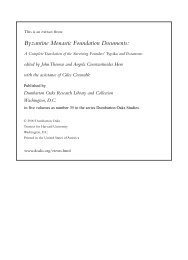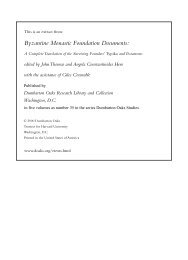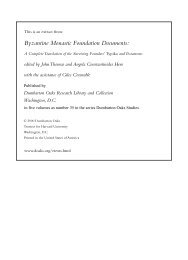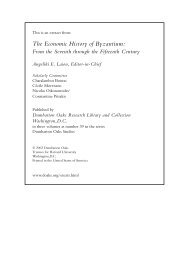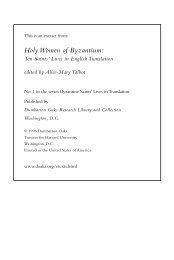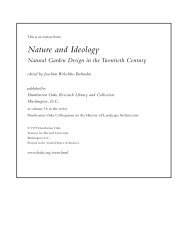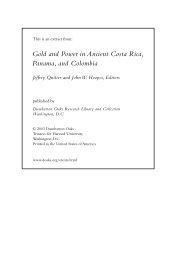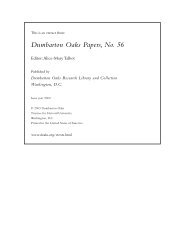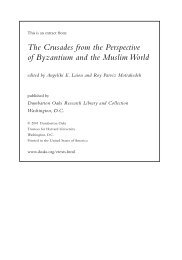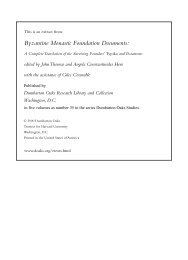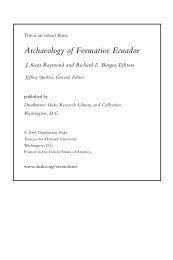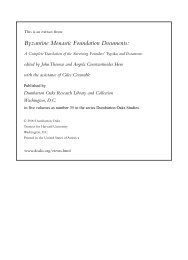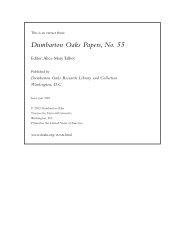22. Evergetis - Dumbarton Oaks
22. Evergetis - Dumbarton Oaks
22. Evergetis - Dumbarton Oaks
Create successful ePaper yourself
Turn your PDF publications into a flip-book with our unique Google optimized e-Paper software.
ELEVENTH CENTURY<br />
as a door that will be barred against him to prevent him going from here to the city and sleeping<br />
anywhere else. If he should ever transgress this instruction, treating it as of no account, he will be<br />
excommunicated. These provisions are so that the superior should never go out of the monastery,<br />
and now I must set down in writing how he should be appointed.<br />
After I have completed this mortal life, the one who is left by me as superior should consult<br />
with a few of you, those, that is, who always surpass the others in their conduct, manners, intellect,<br />
character, discipline, and their spiritual state and way of life, and he should choose the one<br />
who surpasses everyone in all these points and install him as steward; and he should install him in<br />
the following way.<br />
After the dismissal from matins and the customary prayer said by the priest, a trisagion should<br />
be said by all and the one chosen should make three full genuflections in front of and near the holy<br />
sanctuary; then he should reverently kiss the holy, divine, and revered icons of our Lord Jesus<br />
Christ and of the most holy Mother of God and universal Benefactress. After that he should perform<br />
the proper obeisance to the superior and then offer him his head bowed and uncovered and<br />
he, making over it the sign of the venerable cross, should reverently say as follows: “The intercession<br />
of my most holy Mother of God through the prayers of the Holy Fathers is installing you<br />
steward of the monastery.” Then when he has given him the kiss in the name of the Lord, he is to<br />
set him in his appropriate place. Next all without exception are to kiss him, and after the kiss glory<br />
should be given to God and the dismissal should follow the usual prayer of the priest. [p. 51]<br />
If this steward carries out his office faultlessly, proving to be reliable in the sight of God and<br />
you, and being judged by you as fitting for the office of superior, should the superior know in<br />
advance of his own departure from here to the Lord, he should appoint him to leadership over you,<br />
since his faultless actions as steward have already been enough to act as a test and selection and,<br />
as has been mentioned before, his mode of life has been spiritual in every way. But if the superior<br />
should die without knowing in advance, then you, that is those who are preeminent and the most<br />
devout, should place this typikon on the holy table and rest also the staff against it and when the<br />
one selected has entered the holy sanctuary, after the prescribed trisagion and these troparia:<br />
“Have mercy on us, have mercy, O Lord,” “Lord, Lord, turn to us from heaven and behold and<br />
visit” (Ps. 79 [80]:14), “Glory both,” “Thou, the only begotten Son, of the same substance with<br />
Thy Father and the Spirit,” and thirty repetitions of “Kyrie eleison” and, after he has made three<br />
full genuflections before the holy table, you should invite him to take from it the typikon and the<br />
staff while all repeat “He is worthy.” You should invite him to go out and stand in his appropriate<br />
place and be kissed by everyone and become your next superior appointed by God. Then again he<br />
and you should select the one who surpasses you all in virtue, and install him as steward in accordance<br />
with the regulation stated above. So much for those matters.<br />
What follows I did not wish to commit to writing. For it should not be necessary to remove<br />
from his position and rank someone who has previously been selected for it. This would be a<br />
pleasing and agreeable state of affairs if in fact we remained unchanged and completely unmoved<br />
in our adherence to what is good, but that is impossible, for we often change and alter, such is<br />
human nature, and when we are thought worthy of honor we grow weaker with regard to the<br />
performance of good deeds, whether it is through giving way to laziness, as in most cases, since<br />
authority has a habit of weakening those who have been elevated to it whereas they ought to<br />
[ 484 ]




